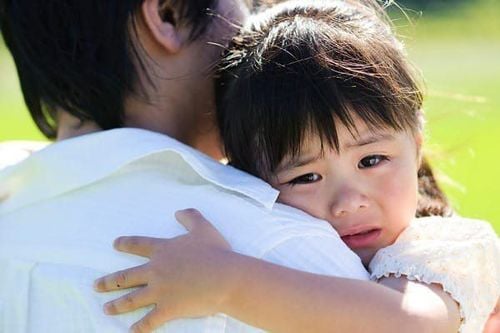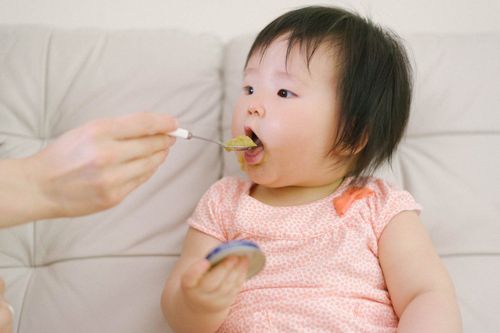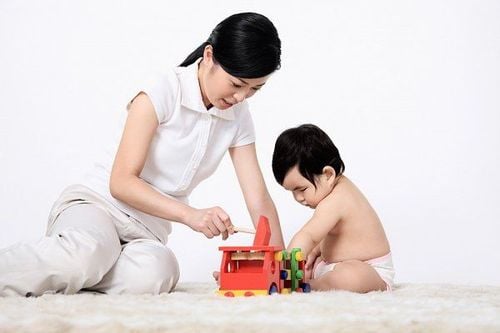This is an automatically translated article.
Every parent wants to create the best conditions for their child, everyone wants their child to grow up healthy, happy and happy. Parents always think that what they do is right, and surely their children will like it, or that it will make them happy. However, experts who study child development say that happiness is not something you give your child, but something you teach him.1. What to do to make children happy?
Every parent wants to create the best conditions for their child, everyone wants their child to grow up healthy, happy and happy. Parents always think that what they do is right, and surely their children will like it, or that it will make them happy.But the things that make your baby happy can surprise you, surprise you because you didn't think it would make your baby happy. Child development experts say that happiness is not something you give your child, but something you teach him.
Edward Hallowell, psychiatrist and author of The Childhood Roots of Adult Happiness, says children are overindulged, even though they are given expensive toys or are shielded from difficult emotions. are more likely to become bored, cynical, and unhappy adolescents.
"The best predictors of happiness are internally, not externally," says Hallowell, who emphasizes the importance of helping children develop an inner set of tools they can rely on. them throughout life.
You don't have to worry too much, because you don't have to be an expert in child psychology to impart the inner strength and wisdom needed to help your child get through life's ups and downs. With patience and flexibility, any parent can lay the foundation for a child's lifelong happiness.
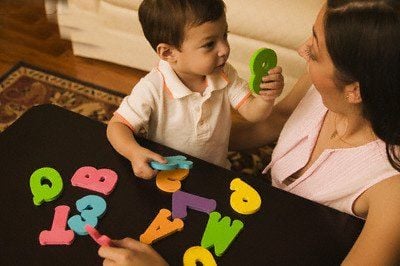
Cha mẹ nào cũng muốn con mình lớn lên khỏe mạnh, vui vẻ và hạnh phúc
2. How to raise a happy child
2.1. Learn to read your baby's emotions
When your baby is 6 months old, he will interact with you more, his expressions will let you know when something makes him happy or upset.Your baby's face lights up with a heart-melting smile when you walk into the room, or he whines when someone takes away his favorite toy. And you may have noticed that babies switch between laughing and crying faster than they even put a pacifier in their mouth.
According to Lise Eliot, a pediatric neurologist and author of “What's Going On in There? How the Brain and Mind Develop in the First Five Years of Life," a baby is very emotional because her cerebral cortex, which controls automatic responses, is barely functioning. As the cerebral cortex develops in the coming years, children will be able to better control their behavior and moods.
If it seems babies spend more time crying than giggling, it's because they're actually experiencing pain sooner than happiness. Eliot explained that the crying and distressed facial expression was there for a reason. They act as a plea for help to motivate caregivers to correct whatever is not right.
2.2. How to hug a crying baby
Just because a child is happy, doesn't mean the child never cries. When your baby is crying, how do you know if he's in pain, hungry, or just bored? Professor of psychiatry Paul C. Holinger said: “A sensitive mother can recognize different types of cries and facial expressions of her baby.”Eyebrows, mouth and voice are all signaling systems for babies, you can rely on the expression of these factors to judge why your baby is crying:
When in pain, a baby will cry in the corner The mouth is down and the eyebrows are arched in the middle. When angry, the baby's face is red, his eyebrows are lowered, his jaw is clenched and he growls. Most parents realize that a child who is easily frightened or upset is not an unhappy child. But many parents don't realize that their child's anger is simply excessive anxiety. Professor Holinger said: “If there is loud noise or bright light, the child will show an upset expression. If that noise or light continues to increase, that feeling will turn to anger.”
Child psychologist Carrie Masia-Warner, associate director of the Institute of Mood and Anxiety Disorders at New York University School of Medicine, warns that we shouldn't talk too much about a baby's mood. According to her, do not call the children a happy child or an unhappy child.
Although the youngest babies don't really feel happy when they look happy, they are also not emotionally aware when they are screaming. This is because the emotional centers in your baby's cerebral cortex don't start working until he's 6 to 8 months old. As your baby begins to feel emotions, his facial expressions may surprise you.
Your baby may have his own ways to show you when he's not happy. Some babies may cry, while others will cling to you emotionally. When you know your baby's temperament, you'll be better at recognizing the signs that something is wrong in your baby's world.
2.3. Happy baby
While a colorful portable crib and a baby's first taste of a food can bring a smile to your baby's face, what makes baby happiest is much simpler: you. And that is the first key to raising a happy child.To be able to raise happy children, you need to connect with them, play with them. When playing with your baby in a happy mood, it means that the child is also having fun. Connecting with your child at an early age is the best step to ensuring he or she grows up happy.
Play makes for fun, but play is also a way for children to develop the skills they need for future happiness. As children get older, games allow them to explore what they love to do such as: building houses with different blocks, making "magic potions" from kitchen ingredients, painting watercolors, etc. All can be directed to the interests of the child later.
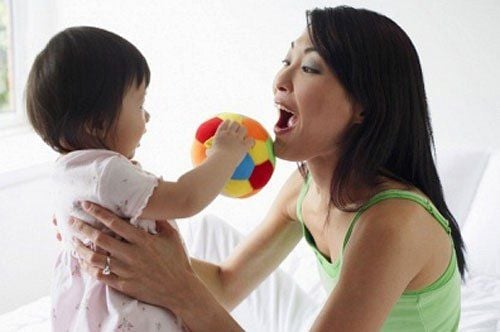
Để có thể nuôi dạy trẻ hạnh phúc, bạn cần kết nối với trẻ, chơi với trẻ
2.4. Help your baby master new skills
According to Dr. Hallowell, happy people are often those who have mastered a skill. Like when a baby tries to put a spoon in his mouth or takes those first shaky steps on his own, he learns from his mistakes, learns perseverance and discipline, and then he experiences joy. success through your own efforts.Children also receive rewards when others recognize their achievements. Most importantly, children discover they have some control over their lives: If they try, they will. Dr. Hallowell says this sense of control through mastery is an important factor in determining adult happiness.
However, children, just like adults, need to follow their own preferences, otherwise there will be no joy in their own successes.
2.5. Nurturing your baby's healthy habits
Adequate sleep, exercise and a healthy diet are important for everyone's health, especially children. Give them plenty of space to release their energy, so they can do the things they enjoy like kicking their feet in the air, crawling towards their favorite ball, or pacing back and forth, or sitting on the infant swing. at the park, will help guide your baby to a good mood.You should also pay attention to your baby's mood towards specific foods and dishes. Some parents find that while sugar can give their child an energy boost, it can also make a baby fussy.
Food allergies and sensitivities can also play a role in a child's behavior and mood. If you're breastfeeding, you may find that your baby becomes fussy after you eat certain foods.
2.6. Let the children find happiness
During the first six months of a child's life, it is important for parents to meet the child's needs, which cannot spoil a child. But after about six months, if your running continues to meet all of your child's needs, you may be taking away an important learning opportunity for your child. If you give your baby lots of love and positive attention for the rest of the time, it's okay to let him cry a little.A big mistake that many parents make because they love their children too much is to unconditionally meet all their children's requests. They think it's a good thing they should do for a child, that's how they raise a happy child. But that seems to have backfired.
In fact, children need to learn to endure some suffering, some unhappiness. Let your child fend for himself, figure things out, because that allows him to learn how to deal with whatever happens to him.
In the first year, a child will learn a lot of things: learning to sit, learn to crawl, learn to hold objects, learn to walk and learn to talk. Each achievement will give children confidence and satisfaction about their achievements. So, don't rush to pick up the rattle they just dropped or the teddy bear they're struggling to get, instead give your child some time and encouragement to pick it up on her own.
Dr. Hallowell suggests that allowing children to experience a range of experiences, even difficult or disappointing ones, helps children build the inner strength that leads to happiness. Whether a child is 7 months old and is trying to crawl or a 7 year old is struggling with subtraction, parents should not interfere, but encourage the child to do the work. Children will get better at dealing with adversity just by facing it.
2.7. Allow the child to be sad or angry
As your baby gets older, you can encourage her to record her feelings and put them into words. Before he can even talk, you can show him a picture of a face and ask him how he's feeling with such a facial expression.Young children pick up words like "happy" or "angry." When children talk about their feelings, it's easier for them to recognize and regulate their emotions.
However, you should not overreact to your child's negative emotions. Sometimes children become overly sensitive or anxious because of something in their environment, which is completely normal, and not unhappiness.
You will find this especially important as your child gets older. When a kid pouts, and sits in the corner at a birthday party, your natural reaction may be to urge him or her to join in the fun. But it's important to allow the child to feel the unhappiness.
Some parents worry whenever their kids are denied something, they are not invited to a birthday party, or they cry because they didn't get what they wanted.
Children need to know that it's okay to be unhappy sometimes, it's simply a part of life. And if you try to suppress anything that makes your child unhappy, you can send the message that it's wrong to feel upset. Let your child experience how he or she feels, including sadness.

Trẻ em cần biết rằng đôi khi không vui cũng không sao, đó chỉ đơn giản là một phần của cuộc sống
2.8. Teach your baby to share and care
Research shows that people who feel meaningful in life are less likely to feel depressed. As children grow up, they can be taught how satisfying it is to help others even if it's just a small thing.As early as 10 months old, you can teach your child about the satisfaction of giving and receiving. If you give your child a cookie, let him do the same by offering you a piece. If you brush your child's hair, give them a chance to brush yours. Show your child how his generosity makes you happy.
These little moments can nurture the ability to share and care for others. As children get older, letting them do simple household chores, such as putting dirty clothes in the bin or setting the table, can help them feel that they are contributing something to the family.
2.9. You are a role model for children
According to Dora Wang, assistant professor of psychiatry at the University of New Mexico School of Medicine and mother of a 3-year-old, research shows that you can pass your temperament on to your child. This is not necessarily through genes, but through your behavior and the way you raise children.For better or for worse, the mood of the children will depend on the mood of the parents. Even very young babies imitate their parents' expressions of emotion, which activates specific neural pathways in the brain. In other words, when you laugh, your baby smiles too. Likewise, if you have a child who has a colic and cries for hours, the best thing you can do is stay calm, because that can stress you out, but if you show stress, your child will also be stressed. will learn from that.
For children to be healthy and develop well, it is necessary to have a nutritious diet in terms of quantity and quality balance. If children are not provided with adequate and balanced nutrients, it will lead to diseases of excess or lack of nutrients, which adversely affect the comprehensive development of children in terms of physical, mental and motor skills.
Children who do not eat properly are at risk of micro-mineral deficiency causing anorexia, growth retardation, malabsorption,... If they notice the above signs, parents should supplement their children with products. The supplement contains lysine, essential micro-minerals and vitamins such as zinc, chromium, selenium, and B vitamins to help fully meet the nutritional needs of children. At the same time, these essential vitamins also support digestion, enhance nutrient absorption, help improve anorexia, and help children eat well.
Parents can learn more:
Signs of zinc deficiency in children
Micronutrient deficiency and failure to gain weight in children
Please regularly visit Vinmec.com website and update useful information to take care of your child. Take care of the baby and the whole family.
Article referenced source: babycenter.com





